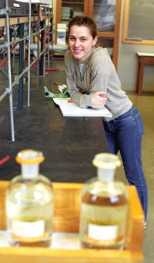At first glance, junior Erika Ebbel's list of accomplishments reads like that of a typical MIT high achiever. She's a junior in chemistry with an interest in biowarfare research, a premed student interested in cardiac surgery and a gifted, classically trained pianist.
But the list takes an apparent left turn at the words "Miss Southern Massachusetts."
Inspired by last year's Miss America competition and at a friend's insistence, Ebbel entered her first pageant last fall and was encouraged by the result.
"I didn't train at all; I just went in cold and found out what the whole thing was about," said the native of Hillsborough, Calif.
She placed second, and afterwards the judges urged her to try again. She did, and with the insights gained from her first pageant, won her present title and a chance to compete in the upcoming Miss Massachusetts contest.
While it's tempting to forge a dichotomy between life on the runway and life in the lab, Ebbel dismissed this view.
"To win a pageant, you must have numerous interests, poise, intelligence, good speaking skills, confidence and the ability to persevere. To succeed at MIT, an individual must exhibit similar traits," she said.
Recent history supports her claim. Five years ago Susan Rushing, then a sophomore in brain and cognitive sciences, helped finance her MIT education when she won the Miss Frederick (Md.) pageant.
In Ebbel's case, the connections are similarly evident. During the talent portion of the competition, Ebbel, a music minor and graduate of the San Francisco Conservatory of Music, performed Chopin's "Fantasy-Impromptu" on the piano. Each contestant must also choose a "platform issue" she will work for; she will promote young women's involvement in math and the sciences.
"I have a background in science fair research and I'm hoping to train students in how to do a good science research project," she said.
Her qualifications for this endeavor are bolstered by an intensive double course of study at MIT that has her researching viruses in chemistry while examining the intricacies of the human heart in her premed program. After graduation she wants to work both as a heart surgeon and in pharmaceutical development, or at the Centers for Disease Control and Prevention researching ways to fight biological warfare.
So far, the people Ebbel has met at the pageants and at MIT have been supportive of her varied life. Despite a wide range of backgrounds, pageant contestants are uniformly confident, outspoken and intelligent, she said, and she counts many of them as friends.
At MIT, where the words "platform issue" usually connote an incompatibility between computer operating systems, Ebbel has had fewer opportunities to broach the subject of her pageant successes. Those she has told have reacted positively, and her advisor, Professor of Chemistry Alexander Klibanov, "was very pleased and supportive," she said.
Ebbel's next foray as a pageant competitor is the Miss Massachusetts contest in Fall River this June. This event determines who will represent Massachusetts in the Miss America contest. With any luck, the judges will look favorably on contestants with scientific ambitions as well as beauty.
A version of this article appeared in MIT Tech Talk on February 27, 2002.







